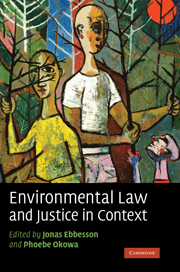Book contents
- Frontmatter
- Contents
- List of contributors
- Preface and acknowledgments
- 1 Introduction: dimensions of justice in environmental law
- Part I The notion of justice in environmental law
- Part II Public participation and access to the judiciary
- Part III State sovereignty and state borders
- Part IV North–South concerns in global contexts
- 15 Competing narratives of justice in North–South environmental relations: the case of ozone layer depletion
- 16 Climate change, global environmental justice and international environmental law
- 17 Justice in global environmental negotiations: the case of desertification
- Part V Access to natural resources
- Part VI Corporate activities and trade
- Index
- References
17 - Justice in global environmental negotiations: the case of desertification
from Part IV - North–South concerns in global contexts
Published online by Cambridge University Press: 28 June 2009
- Frontmatter
- Contents
- List of contributors
- Preface and acknowledgments
- 1 Introduction: dimensions of justice in environmental law
- Part I The notion of justice in environmental law
- Part II Public participation and access to the judiciary
- Part III State sovereignty and state borders
- Part IV North–South concerns in global contexts
- 15 Competing narratives of justice in North–South environmental relations: the case of ozone layer depletion
- 16 Climate change, global environmental justice and international environmental law
- 17 Justice in global environmental negotiations: the case of desertification
- Part V Access to natural resources
- Part VI Corporate activities and trade
- Index
- References
Summary
Experiences from Chairing the Negotiations of the Desertification Convention
This chapter is based on the practice of diplomacy, rather than academia, and it is not intended to break new theoretical ground. It is an effort to draw some conclusions from practical experience as an active participant in negotiations on sustainable development over the last fifteen years. More particularly, it deals with the 1994 UN Convention to Combat Desertification in those Countries Experiencing Serious Drought and/or Desertification, Particularly in Africa (Desertification Convention), where I served as chairperson of the UN committee that negotiated the Convention.
Some people might say that the Desertification Convention is not really an environmental instrument, but rather a multilateral treaty on development cooperation. However, the borderlines are not very clear, since the Desertification Convention is one of the three conventions established in connection with the Rio Conference on Environment and Development in 1992. Together with its sister conventions on, respectively, climate change and biodiversity, it is part of a major effort to tackle global environmental problems in such a way that the effort of reducing poverty in developing countries and secure equitable growth is not hampered. In fact, the UN World Commission on Environment and Development, known as the Brundtland Commission, in its 1987 report, Our Common Future, not only launched the concept of ‘sustainable development’, but also brought environment and development closely together through its insistence not only on inter-generational equity but also on intra-generational equity.
- Type
- Chapter
- Information
- Environmental Law and Justice in Context , pp. 333 - 348Publisher: Cambridge University PressPrint publication year: 2009



